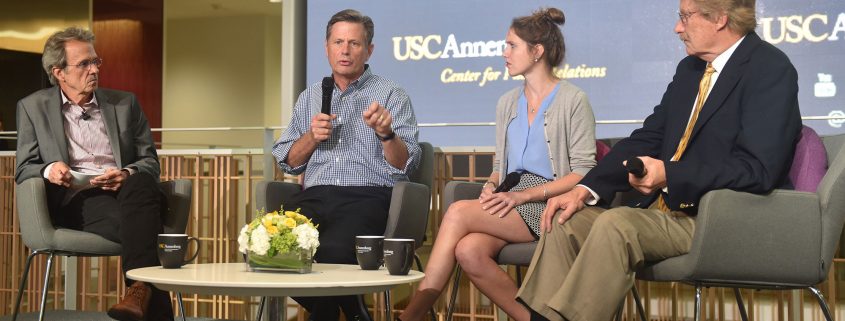Panel discusses the future of renewable energy
The Annenberg School for Communication and Journalism hosted the “Future of Energy” forum on Tuesday night in the Wallis Annenberg Hall lobby. The panel aimed to discuss the transition of energy in the coming years to meet the needs of a growing global population and to address some of the major environmental challenges of our time.
The panel was moderated by Fred Cook, Director of the USC Center for Public Relations and the CEO of Golin, a global public relations firm. Panelists included Dr. Don Paul, executive director of the USC Energy Institute; Niel Golightly, VP of energy transition strategy, U.S., Shell Oil Company; and Brenna Clairr O’Tierney, an External Relations Advisor for Shell and an Annenberg alumna.
One of the central topics of the discussion was the time it may take for a transition towards renewable energy sources and away from traditional fossil fuels to occur, in an effort to curb global climate change and reduce pollutants and emissions. In spite of decades of effort by the government and corporations like Shell, the majority of energy in the U.S. is still derived from sources like coal, oil and natural gas, among others.
“The challenge in all of these transitions is that, for the better part of 150 years, the U.S. has had consistently low energy prices,” Paul said. “We’ve built our system around this for decades.The fundamental challenge is changing people’s attitudes toward energy, transportation and where they live. That’s why the transition is so long, even if you have a technical fix.”
Another key aspect of the conversation was the potential of international agreements to play a role in altering the trend towards increasing fossil fuel consumption, as well as overall energy use.
“Could international agreements converge around an environment that drove the system uniformly, which is what you need to do? They could, but historically they haven’t,” Paul said. “The problem with something of this scale, which will take decades [to solve] no matter what you do, is that things intervene. You can have a major war that intervenes, a major depression [etc.].”
Golightly brought up some of the difficulties faced by companies like Shell to invest in renewable energy sources, one of which is the conflict between shareholders and stakeholders.
“We’re caught in a strange predicament,” Golightly said. “A lot of our stakeholders are saying ‘invest more in wind and solar,’ while many of our investors are saying ‘don’t… invest in [renewables]’… So we look at ways that we can monetize and create value in wind and solar. It may be through joint ventures, or through certain parts of the wind and solar value chain. There are lots of other ways to look at how we can do right by our investors and still be in those businesses.”
Students who attended the panel were impressed by Shell’s commitment to renewable resources, which they said changed their views on an industry that can often be perceived as doing more harm than good to the environment.
“I think with any oil company there’s this sense of distrust with the public,” said Brittany Stamoulis, a first-year graduate student studying strategic public relations. “But it was really nice to see their corporate and social responsibility, and how they’re actually trying to make the future brighter.”
Golightly and O’Tierney also highlighted Shell’s desire to recruit younger working people, who are often drawn towards other industries like technology, which many students appreciated.
“I really like how they’re encouraging millennials to join their company,” Stamoulis said. “They’re seeing the impact of millennials and are trying to get them on board and involved in the change they’re doing.”

